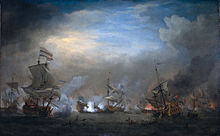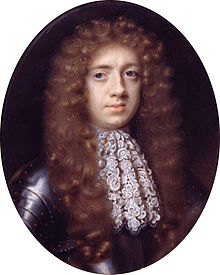Edward Spragge
Sir Edward Spragge , also Edward Spragg or Edward Sprague (around 1629 in Ireland ; † August 21, 1673 off Texel ) was an Irish privateer and later an admiral of the Royal Navy .
His grandfather came to Ireland as an officer during the Elizabethan period, his father Lichfield Spragge was governor of the royalists in Roscommon during the Civil War and fell in 1645. His mother was Mary Legge. Edward Spragge, of whom little is known for sure before 1654, may have served in the Civil War under his uncle William Legge I before joining the royalist navy under Prince Ruprecht in 1648 . After their dissolution he was a privateer with a Dutch letter of war against the English in the First Anglo-Dutch War . After 1653 was associated with the Collaert family from Dunkirk as a privateer (and married Jacob Collaert's daughter Clara ). In the Anglo-Spanish War of 1654 he was in the service of the Spaniards against England. In 1660 his ship was captured by the Dutch and he suffered a heavy loss. During the restoration he was pardoned by Charles II and was given command of the Drake . He was sponsored for some time by Prince Rupert (until Robert Holmes took over his role). The king also frequently used him as an envoy in the Spanish Netherlands. In the naval battle of Lowestoft in 1665 he distinguished himself against the Dutch and was defeated on board the Royal Charles to the Knight Bachelor . In 1666 he became Rear Admiral of the Green Squadron under Prince Ruprecht and fought on the last day of the four-day battle . In the subsequent St. James's Day Fight he was Vice Admiral of the Blue Squadron under Jeremiah Smith. Although the battle was victorious for the English, the rearguard to which Spragge also belonged was defeated by Cornelis Tromp . Afterwards Robert Holmes, who was hostile to him, accused him of cowardice and after he heard mockery from Tromp (he should have let his wife in command, who, as is well known, came from a well-known family of sailors and privateers in Dunkirk), he swore revenge on Tromp . This did not happen for the time being, as Tromp was released in August 1666. After the attack on the Medway , in which Spragge was also present on the English side (but could do little, his failure at Sheerness brought him a lot of criticism), peace was concluded. In 1670/71 he fought on the Revenge barbarians in the Mediterranean, where he was able to destroy ten corsair ships after a battle in the Bay of Bejaia near Algiers in May 1671 . For this he received a large sum and an annual pension of £ 1,000.
In the Third Anglo-Dutch War he commanded the Red Squadron in the sea battle in Solebay in 1672 and the Blue Squadron (with the Prince Royal of 100 cannons as the flagship) in the sea battles at Schooneveld in 1673. There was also another encounter with Tromp and also in the following naval battle off Texel . Spragge and Tromp got into a direct duel between their ships Prince Royal and Gulden Leeuw . Both then had to change their heavily damaged ships, whose crew suffered high losses. Spragge switched to the St. George and after it was damaged he wanted to switch to the Royal Charles . His sloop was hit by a cannonball and sank, Spragge dying (he probably drowned, but his body was still recovered). He is buried in Westminster Abbey, but his grave is not marked there and there is no monument.

In the year of his death he was elected as Burgess for Dover in the English House of Commons , but could no longer take the seat. In addition, the election was canceled due to manipulation after his death.
He bequeathed a large part of his fortune to his illegitimate children (he had four children from his lover Dorothy Dennis). Samuel Pepys attested him an engaging character (and a pleasant singing voice) and he was popular with his subordinates.
Web links
Individual evidence
- ^ Westminster Abbey website
- ↑ a merry man that sang a pleasant song pleasantly
| personal data | |
|---|---|
| SURNAME | Spragge, Edward |
| ALTERNATIVE NAMES | Spragg, Edward; Sprague, Edward |
| BRIEF DESCRIPTION | Irish privateer and later admiral in the Royal Navy |
| DATE OF BIRTH | around 1629 |
| PLACE OF BIRTH | Ireland |
| DATE OF DEATH | August 21, 1673 |
| Place of death | in front of Texel |
